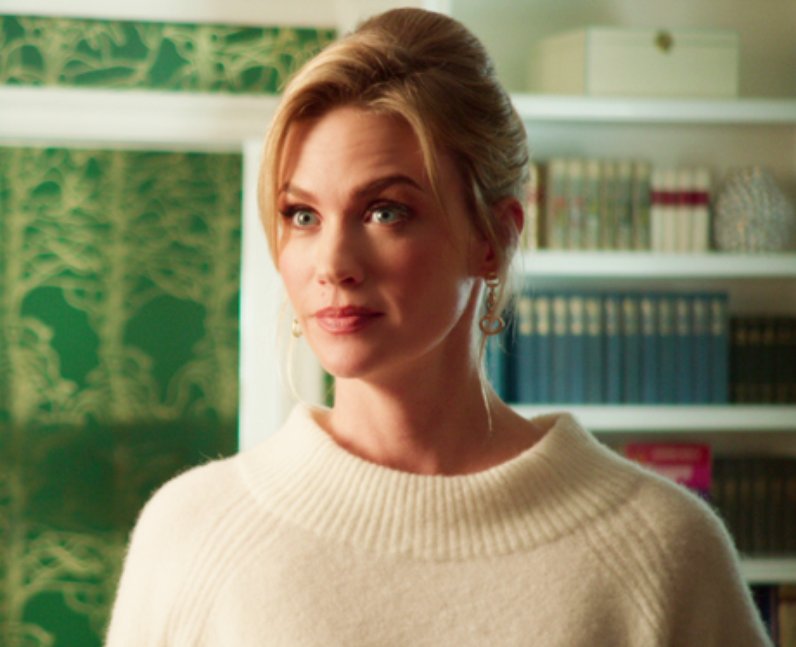While January Jones may have played the bizarre role of Melissa Shart in the equally bizarre cancelled Fox series (because you usually can’t say Fox without “cancelled”), The Last Man on Earth, she has been unable to replicate the magic of her most iconic character–Betty Draper–since Mad Men ended in 2015. Not, that is, until now. Though only brief appearances (as was too often the case on MM) thus far, her role as Lisbeth Sloan on Ryan Murphy’s latest series, The Politician, provides something of a modern edition of Betty D. Still a housewife, still bored, still rather blacked out about the reality of things when she wants to be. Especially thanks to the regular mixture of pills and wine.
From the second we’re introduced to her at the end of episode three, “October Surprise,” she dominates the scene with the line to her husband, Theo (Dylan McDermott), “No sex tonight. I’m still sore from my lipo.” He doesn’t seem that upset as he asks, “Did you bleed on the carpet before we left?” In her stupor, she replies, “I don’t know, I don’t remember.” For anything is possible when one is this heavily dosed on Klonopin. But no, the blood theoretically belongs to whoever has kidnapped their only daughter, Astrid (Lucy Boynton), the Sally Draper (Kiernan Shipka) of the scenario–most especially with regard to her dynamic with Lisbeth.
Theo, too, possesses a similar Don Draper (Jon Hamm) quality in that he overtly regards his wife as a frivolous yet necessary accessory. Hence, as they’re being questioned by the police about Astrid’s disappearance, he comments, “I’m sorry, my wife is–she’s drunk, and on pills. From the way she keeps moving her mouth, I’d guess a combination of Klonopin, vodka and grapefruit juice.” Lisbeth, not to be undermined cuts in, “He wants to have sex with our daughter. That’s why he hates any of the boys that have anything to do with her. He wants her for himself.” Angering Theo, he chimes in, “You know how we met? I hired her from a service called The Girlfriend Experience to be my date at a fundraiser for Ron Paul. I’m telling you this because I want you to know what kind of woman my wife is.” Giving as good as she gets, Lisbeth declares, “I’m not ashamed of who I am. I was an actress performing for an audience of one–you married a hooker, so what does that say about the kind of man my husband is?”
In many senses, Betty was a prostitute as well. Putting herself on the block for the highest housewife bidder that turned out to be Don. Lisbeth, on the other hand, went into her marriage patently aware that the tradeoff would be marrying a philandering monster at the price of “being taken care of.” Being, as Betty was described, “a house cat: very important…with little to do.” With both Betty and Lisbeth designed solely for the visual appeal of their husbands to showcase at select functions, January Jones has mastered the art of how to play this with nuanced complexity.
The moments when she’s allowed the luxury of lines as opposed to dazed expressions gives her a further edge as well. As is the case during an exchange with Astrid after she returns home from running away and explains, “I needed to get away. I’m not happy. I don’t wanna hate my life anymore.” Barely raising her voice, Lisbeth responds, “‘Not happy’ is what antidepressants are for.” Enraged by the suggestion, Astrid snaps, “If I’m too drugged up to know if I’m happy or sad, how am I gonna know if I need to make changes?”
Lisbeth insists, “Honey, people like us don’t make changes. Making changes could risk everything we’ve worked so hard to attain.” Astrid then counters that she can now win the election as a woman of the people. Lisbeth cautions her, “They will see through it. You’re not. You’re one of us.” Just as Betty might say to Sally of her “rebellious” boarding school phase. And just as Sally might go for Betty’s jugular, Astrid counters, “I’m the daughter of a drug-addicted hooker.”
Yet through it all, Lisbeth holds her head high, in the face of her daughter’s public announcement about not being kidnapped and her husband’s arrest for his shady business dealings. She is not a totally heartless person (maybe her people are “Nordic” too), even pleading, “Take me with you” to her daughter as she flees from their house to go back to New York (where she had previously fled to). In full Sally mode, Astrid deadpanly replies, “No.” Discarded, used, abused and underestimated once again as Lisbeth, we can only hope that she will make a better comeback than Betty Draper did as Betty Francis in the later seasons of Mad Men.





















